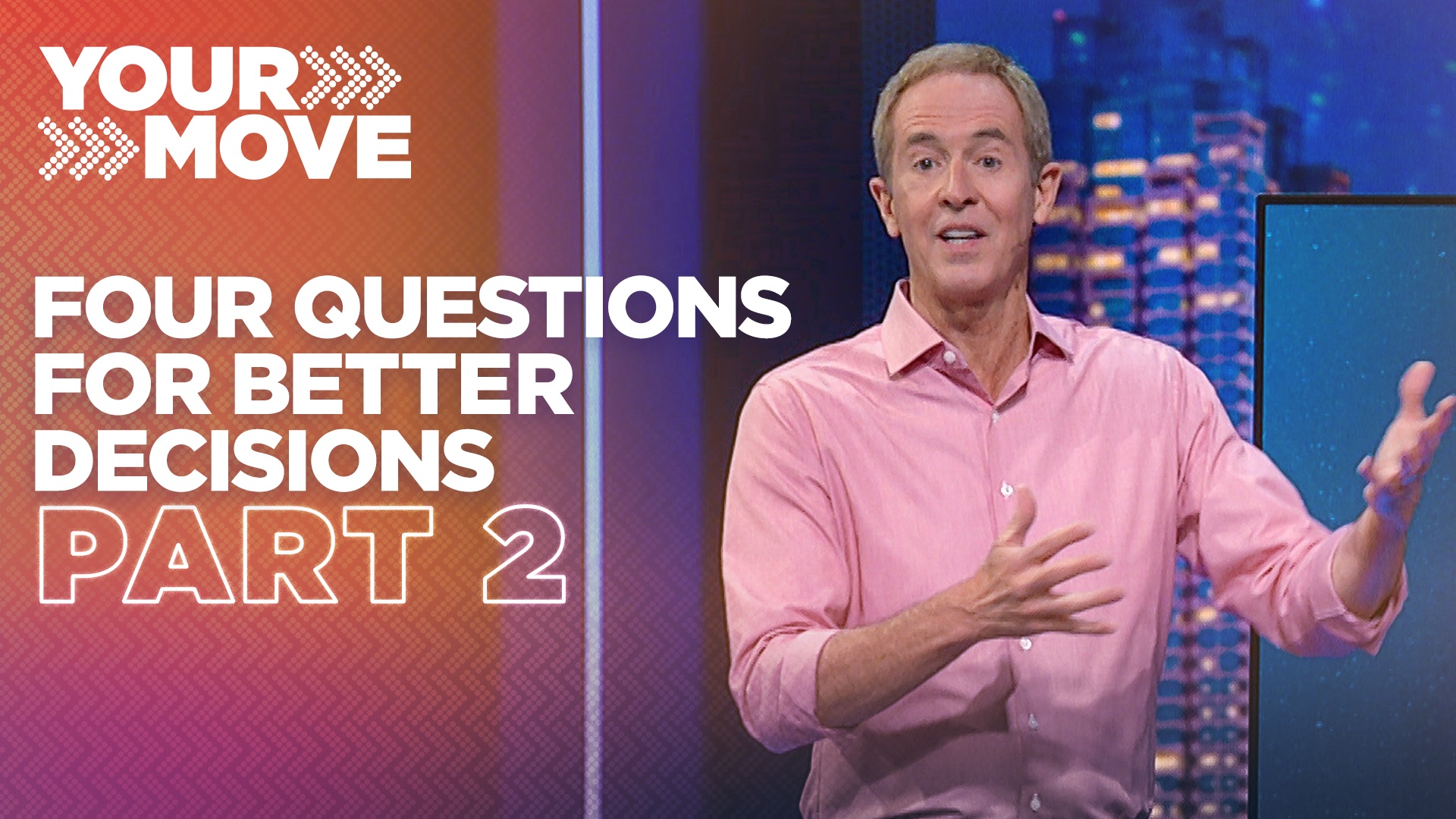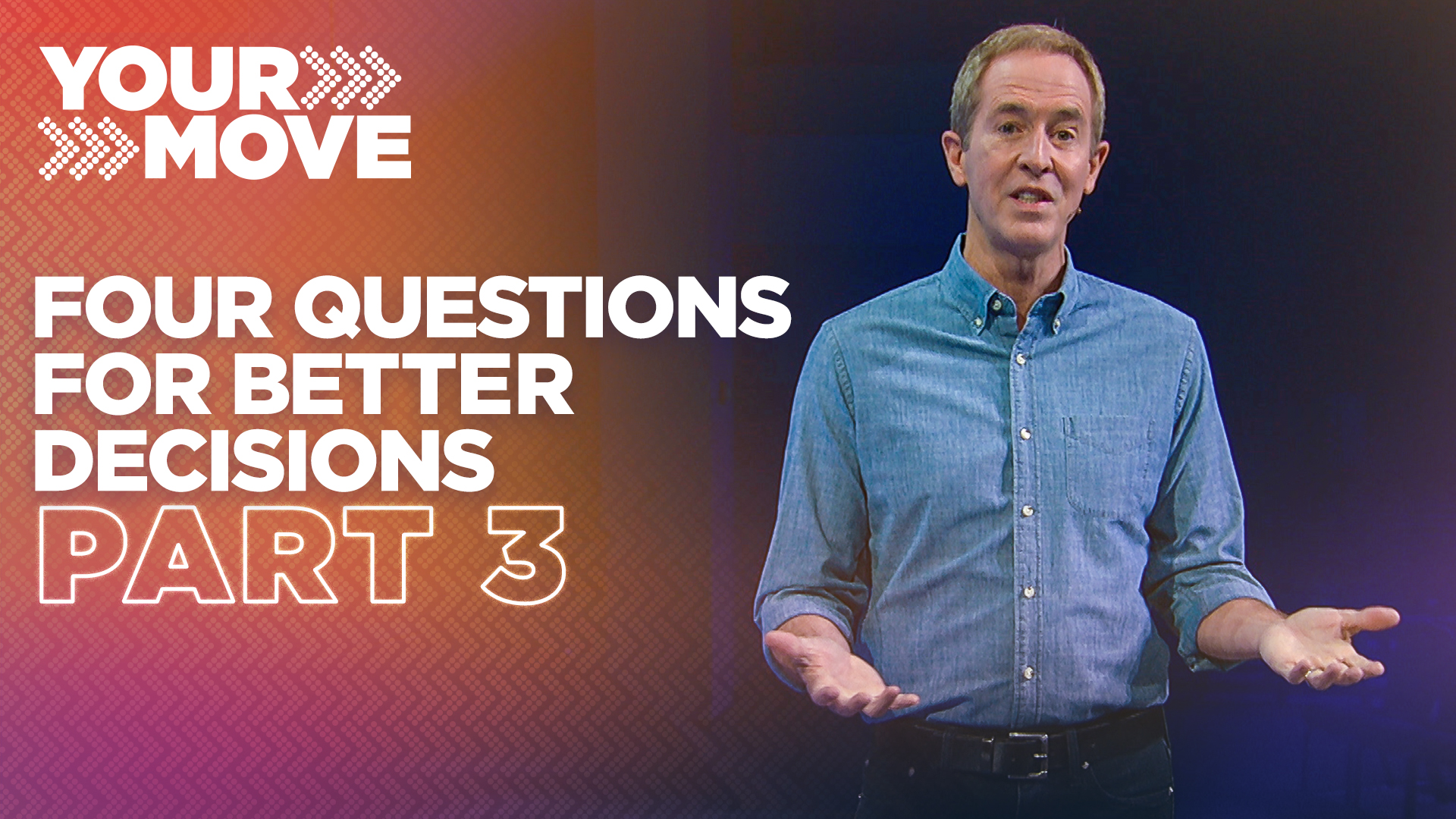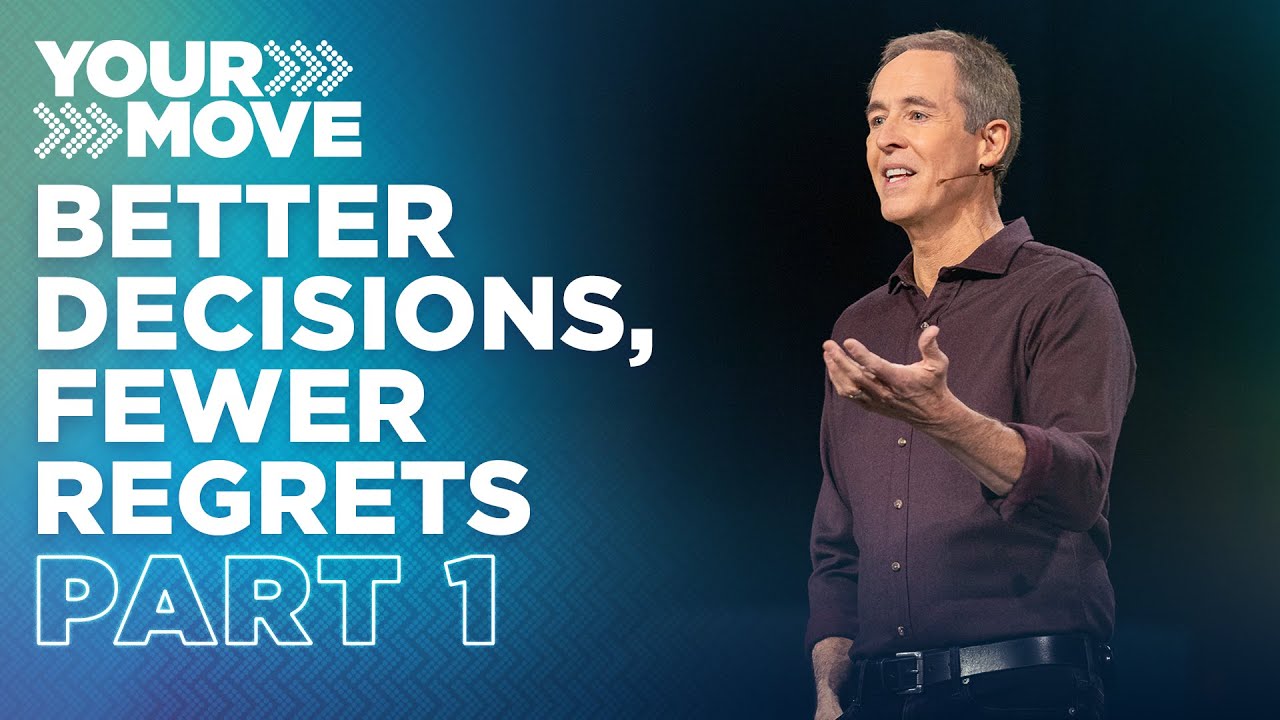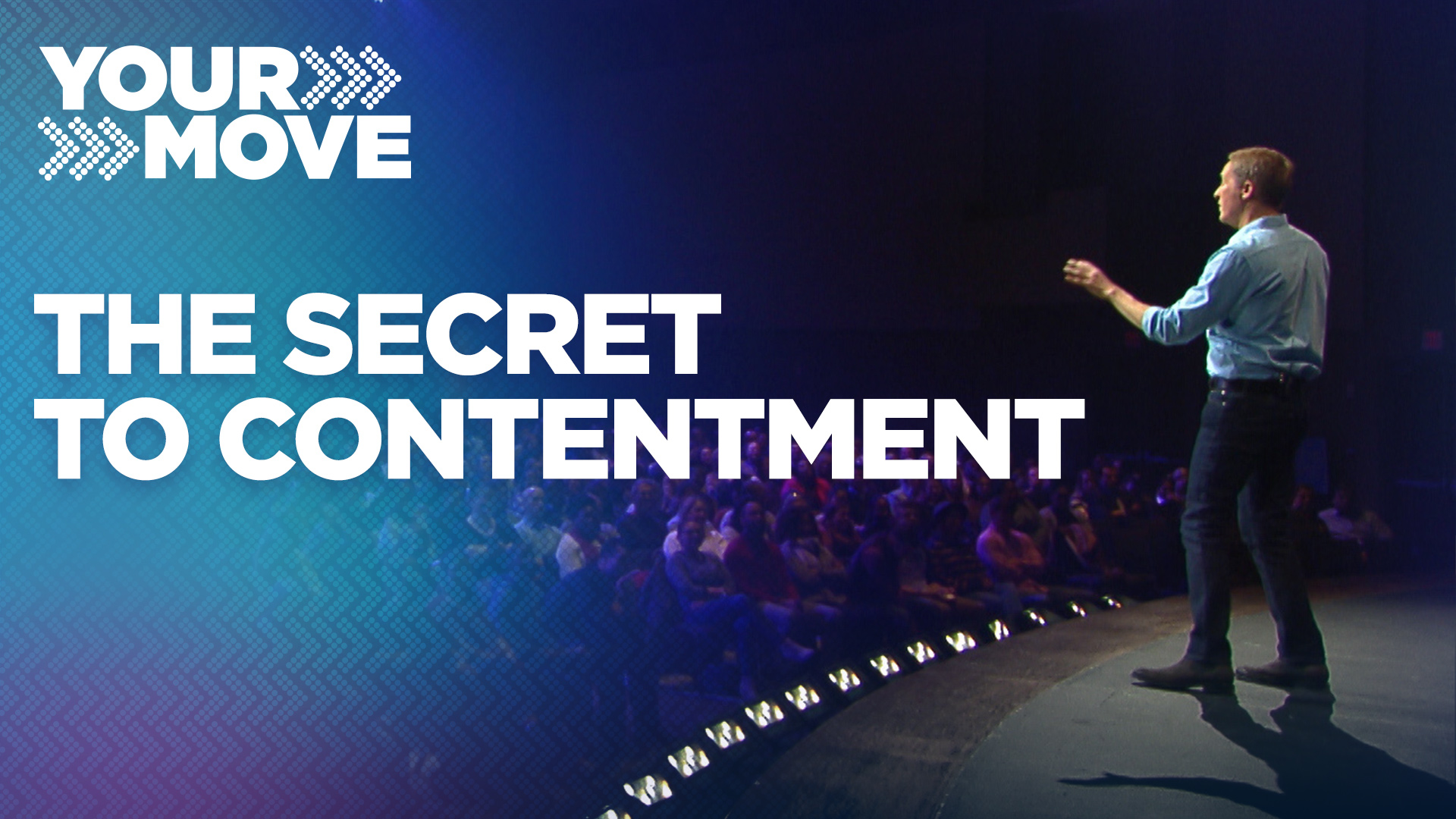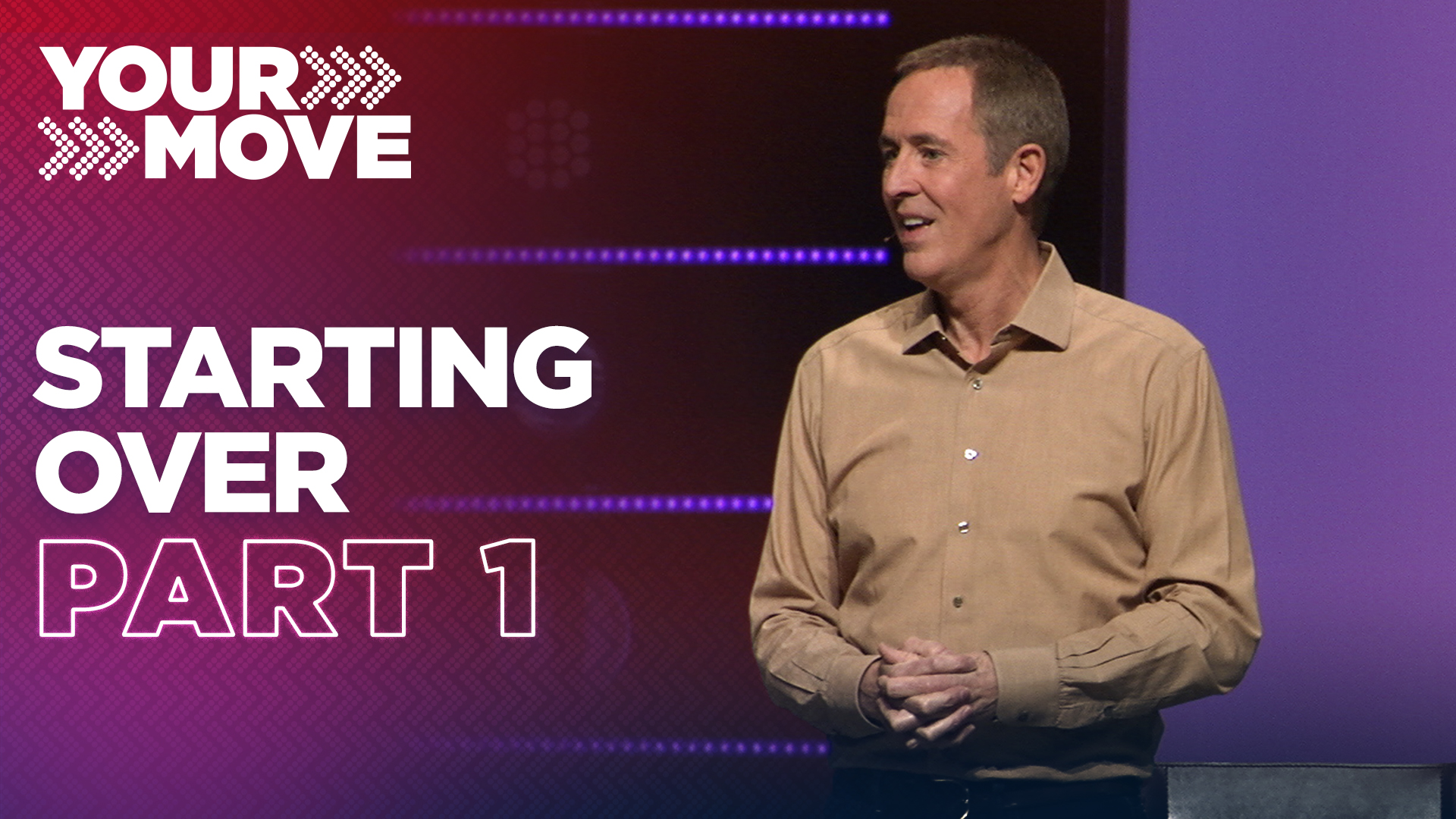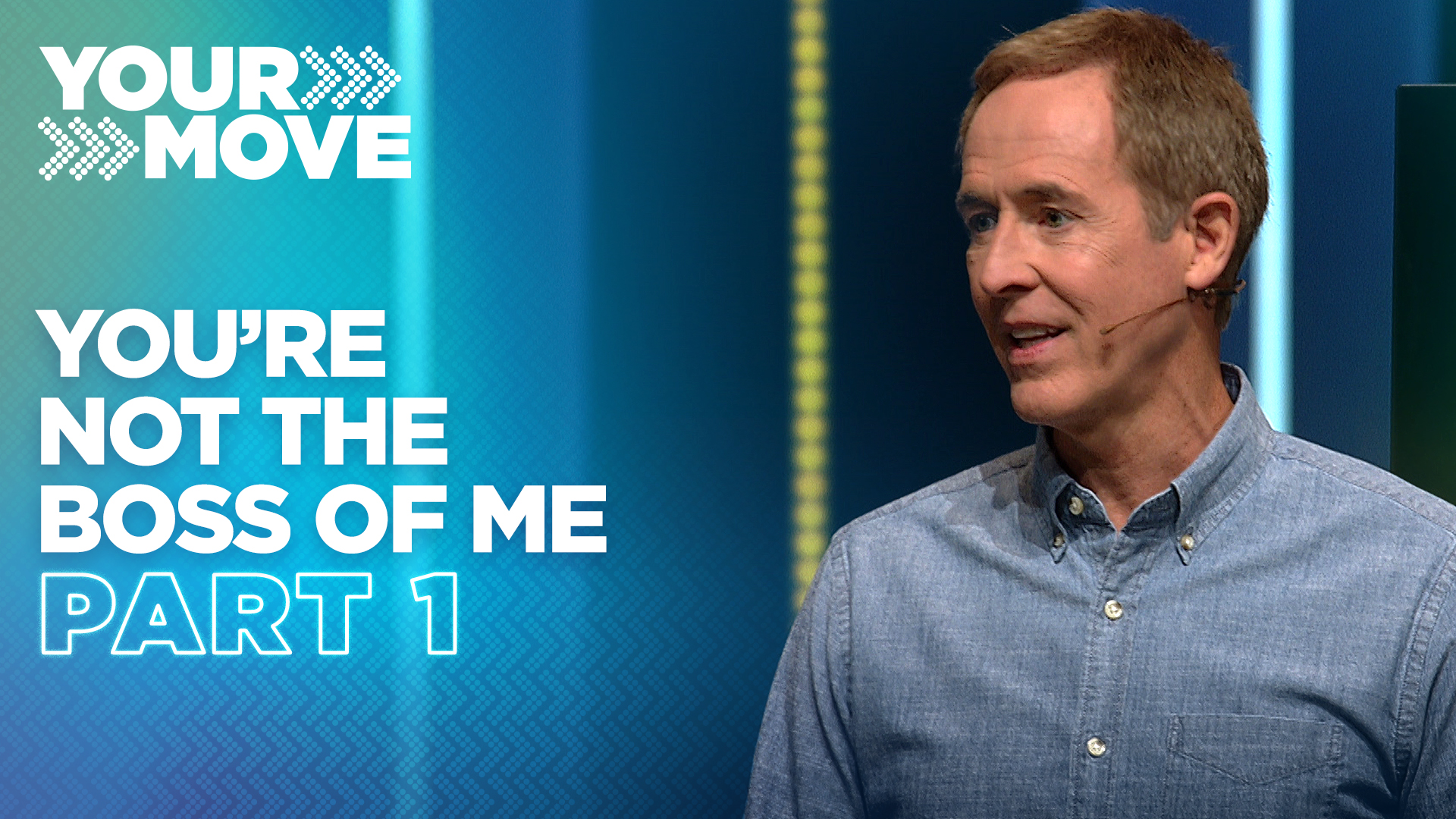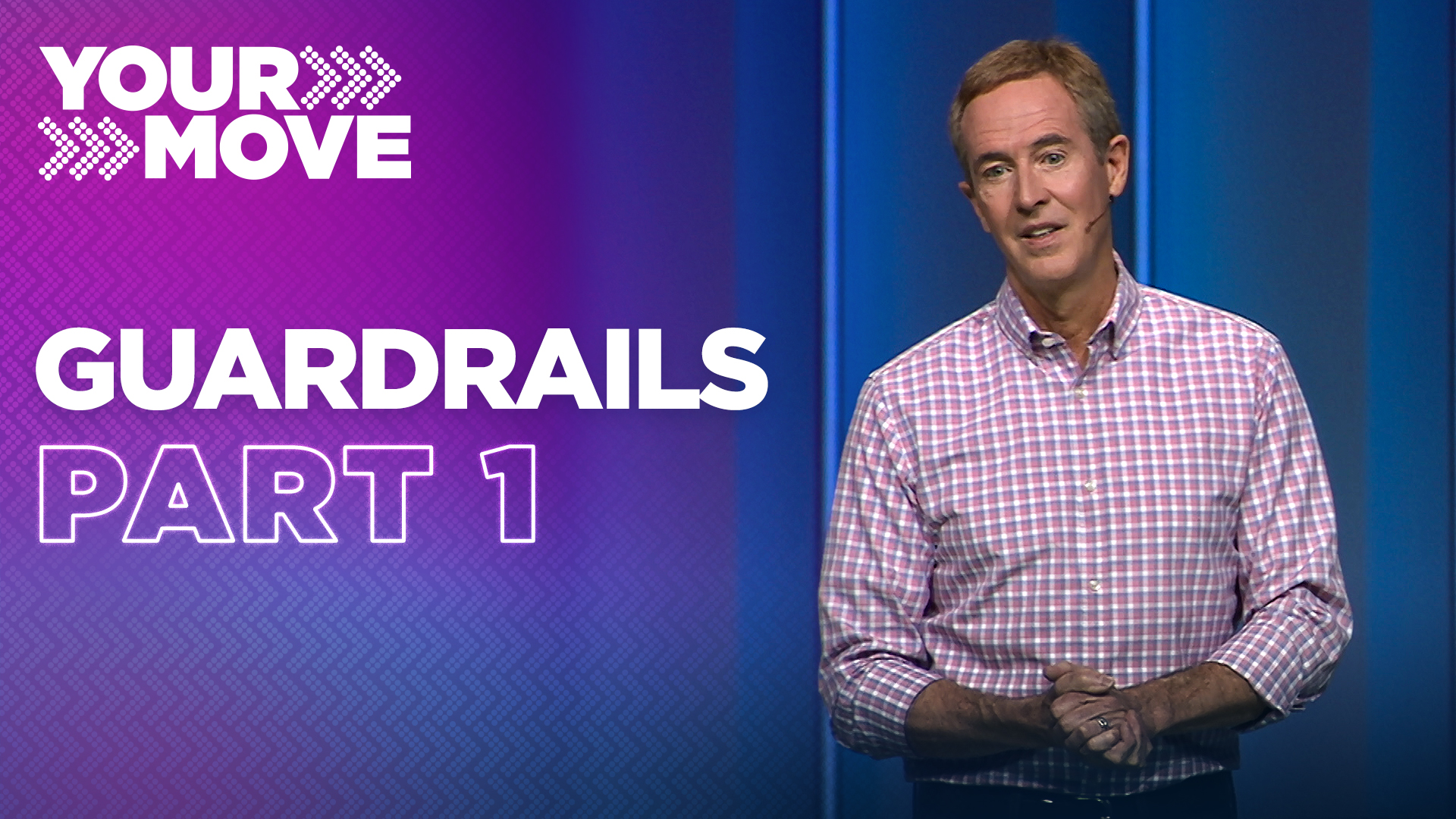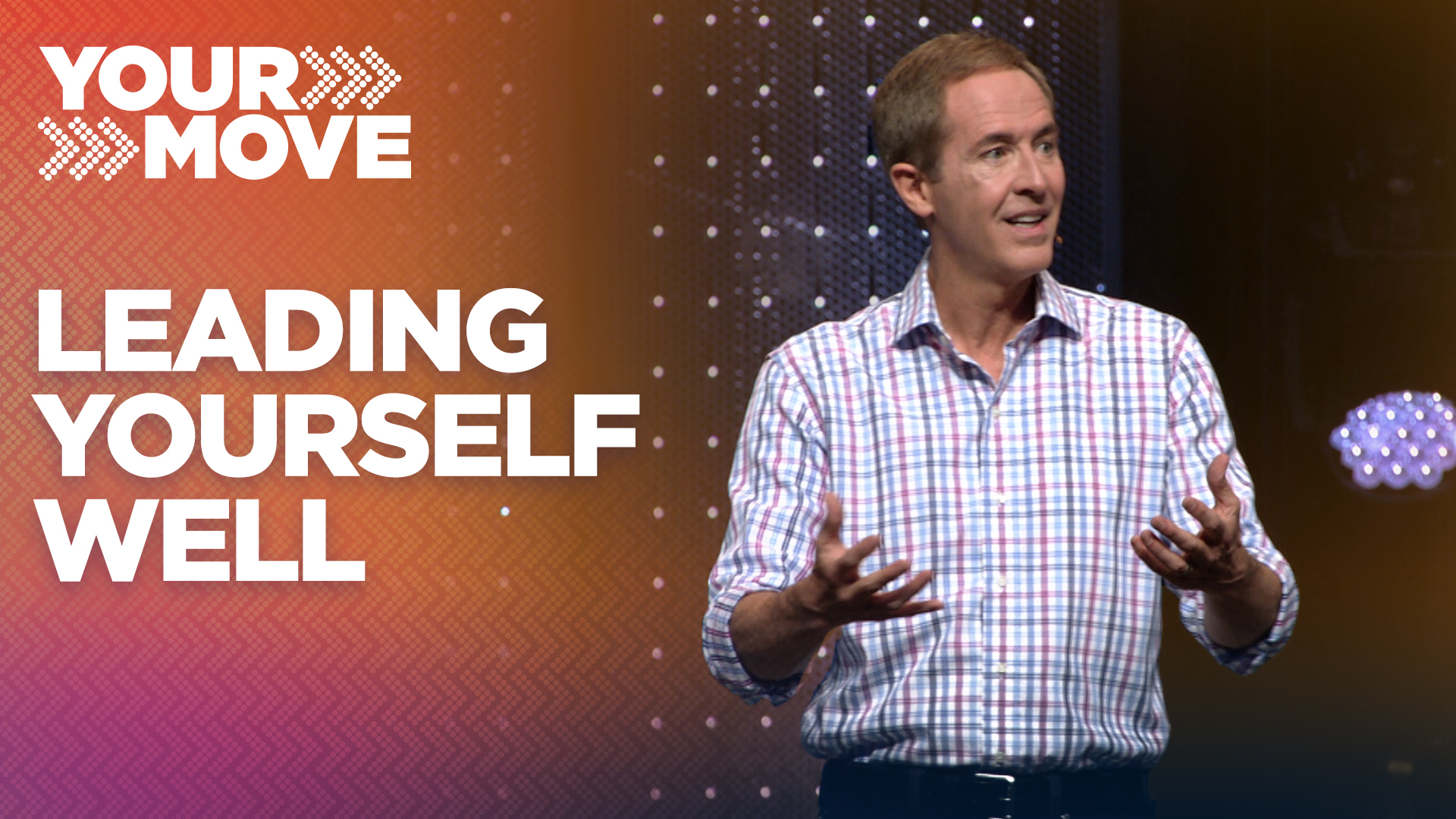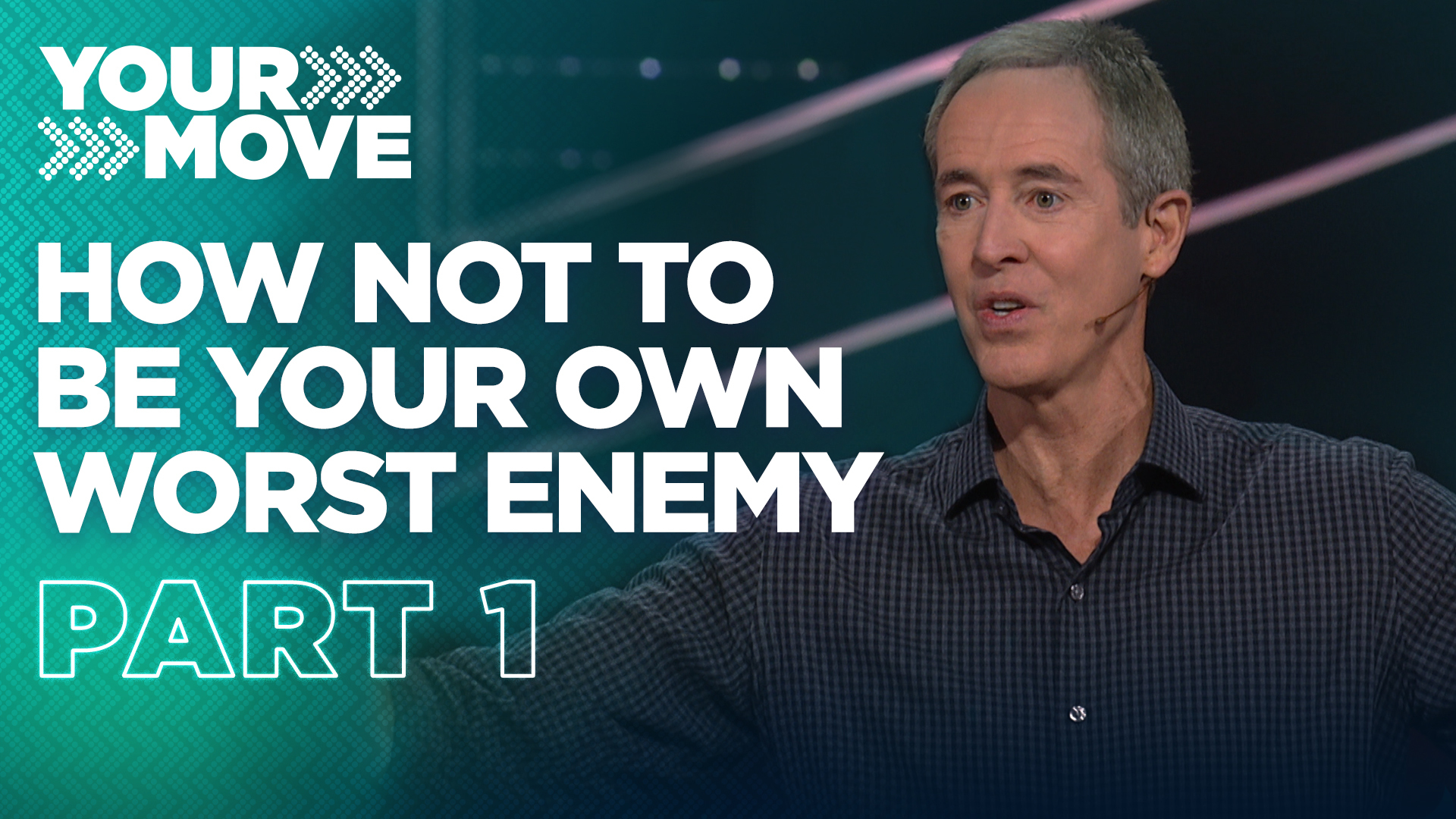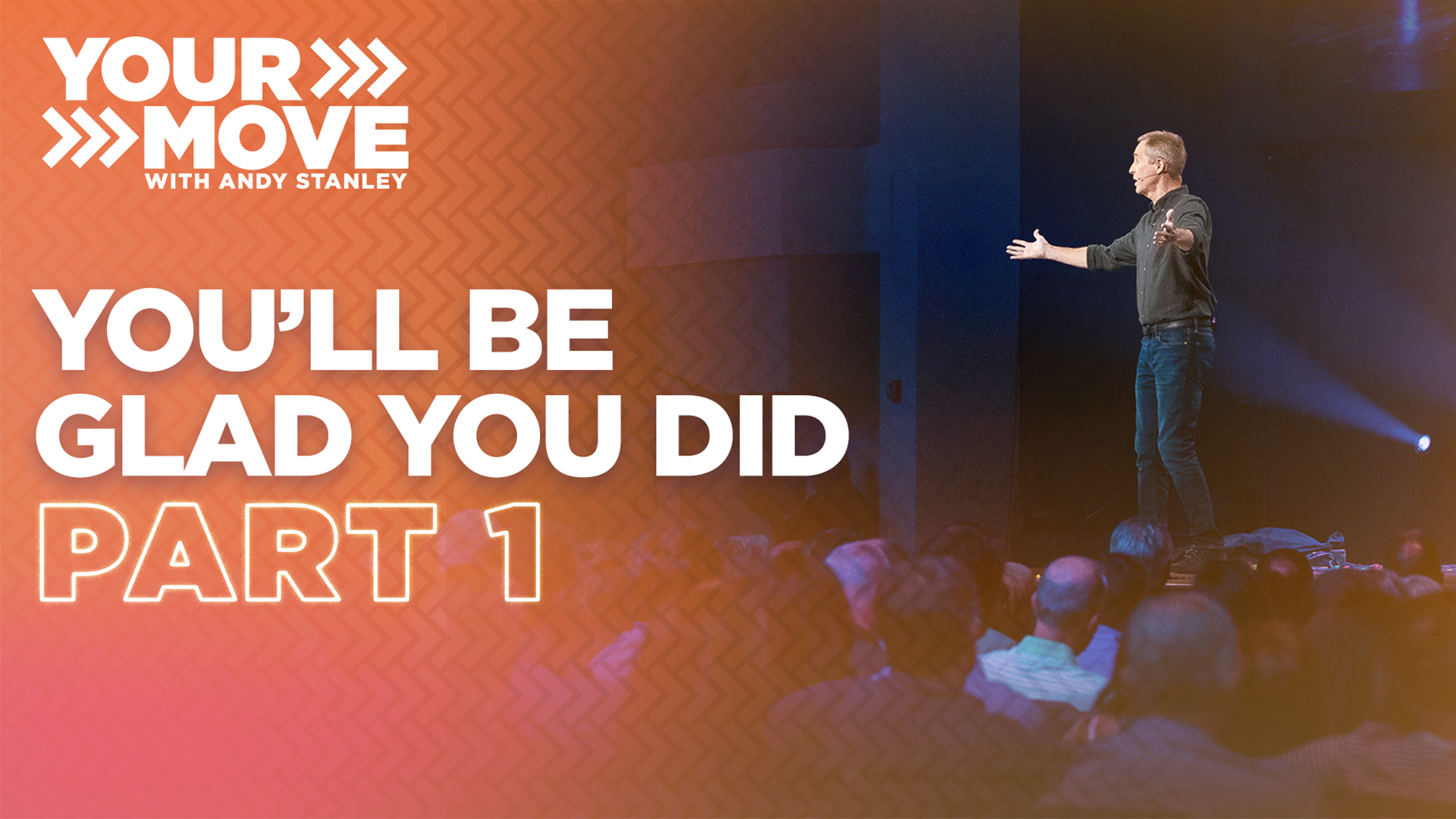“What was I thinking?” We’ve all asked ourselves that question at some point. So, how do we avoid making decisions that become regrets?
- In your experience, what’s the main reason people make decisions they later regret?
- Is there a decision you wish you could go back and unmake? What factors influenced your decision?
- Have you ever attempted to sell yourself on a bad decision? Explain.
- Do you think our culture values being honest with ourselves? Why or why not?
- Have you ever experienced the benefits of telling yourself the truth, even when it was hard to admit? Explain.
- Consider a decision you’re facing right now. How might it help to ask yourself, “Am I being honest with myself . . . really?”
NOTE: The following content is a raw transcript and has not been edited for grammar, punctuation, or word usage.
I’ve spent over 25 years speaking in rooms like this, went on stages pretty much just like this one. But today’s episode is not for a general audience. Today’s episode is for you because here’s what I know about you. Your life is shaped by the decisions that you make. You are where you are for the most part because of decisions you’ve made; your greatest regrets are connected to decisions, well decisions you’ve made. And like me, you can probably think of a few decisions you would like to go back and well, un-make. So for the next four episodes of your move, I wanna talk to you about how to make the best possible decisions, so you can live your best possible life. And the thing… Well, the thing that makes decision-making so tricky is that our big decisions, the ones that really determine the trajectory of our lives, they’re rarely made in emotionally neutral environments, are they?
In fact, research suggests, we wouldn’t even be able to make a decision if it weren’t for our emotions. But it’s our emotions and the emotions attached to many of our decisions that, well it’s our emotions that get us in trouble. For example, have you ever made a really, really bad relationship decision? At the time, well, at the time it seemed right, you were in love or you were in lust or… Well, you were in something and whatever it was, that you were in, it was emotional, wasn’t it? Of course it was, because relationships are emotional.
And your mom had tried to warn you, your best friend tried to warn you, but you assured everybody that you knew what you were doing and you were sure at the time that you knew what you were doing. But looking back, you think, “I should have known better. I should have listened, I should have seen that freight train coming” right? How about this? Ever made a bad purchasing decision? Of course, you have. We all have. But once you… Think about it, once you got your heart set on it, whatever it was, it was… Well, it was over. It was like something took over and the next thing you knew, you were handing your card to somebody you didn’t even know to purchase something you didn’t need and maybe you couldn’t even afford. And then later, you wondered why. “Why did I do that? Why did I buy that?”
In fact, perhaps you’re watching me today on a television you wish you’d never even purchased. And then there are those decisions, we never thought we’d ever have to make, the unanticipated decisions. Have you ever had a friend, for example, if you ever had a friend that was bad for you? Some people call these toxic relationships, you like them, that you’re becoming more like them and you don’t like what you’re becoming. And then somebody comes along and points out the fact that you’re changing for the worse. And suddenly. Well, you have a decision to make. A decision, you never thought you’d have to make. A decision you don’t even wanna make, because either way you go, you lose something. You either lose a friend or maybe you lose a part of you, but you can’t have it both ways.
Some of you have faced a similar dilemma in your professional life. You love your job, you love the company you work for, but… Then you start feeling pressured to do things that aren’t comfortable, things that aren’t ethical, maybe things that border on, well illegal. And you know what you would tell somebody else in your shoes to do, but it’s hard when it’s you, isn’t it? Because either way you go, you lose something, you can’t have it. Both ways.
Now there’s one other dynamic that makes decision-making really difficult and that’s this. We never really know what hangs in the balance of our decisions, do we? We don’t know what the future holds. In some cases, in some cases it takes a lifetime for the outcome of a decision to play out.
Sometimes it takes… Well, sometimes it takes generations. For example, and granted, this is an extreme example, but imagine what would have happened if George Washington had allowed Congress to make him king. Think about the generational implications of that one decision. What about this one? What if Dr. Martin Luther King Jr, what if he had been content to stay up north, and remain silent, in light of everything he knew that was going on in the south? The results of his one decision continue to play out to this very day. Now, I know you are not George Washington, and you’re not Dr. King. But think, generations of people could be impacted by your decisions.
In fact, if you plan to bring children into this world or if you’ve already brought children into this world, I can guarantee you, your personal decisions have generational implications. Now, for somebody listening, your life would be very different if your father had not chosen to keep picking up that bottle, right? Your life would be different if your mom hadn’t run off and left you with your brother and sister and left you guys with your father, right? Perhaps the opposite is true. Maybe it was your dad who conquered that habit and kept the family together.
Maybe it was your mom who chose to stay when another woman would have walked. The point is this. We never know, do we? We never know what or who hangs in the balance of the decisions we make, but what we do know is this, private decisions have public implications. Your private decisions probably won’t stay private, your personal decisions will impact some other persons.
So, in this four-part series, in this four-part series, I’m gonna give you four questions to ask whenever you have a decision to make, big or small. These four questions will actually empower you to live a better life, make better decisions and live with fewer regrets. In fact, these questions are gonna give you a grid or a filter through which to make… Well, to make all of your decisions.
Now, if the idea of having a filter for decision-making sounds a bit strange, the truth is, you actually already have one. Did you know that? Every single decision you make, gets run through a mental filter. Every time you make a decision, you run it through some kind of decision-making grid. Unconsciously, and it’s always unconsciously. Unconsciously you ask questions like this. “Will this make me happier? Will this make me richer? Is this good for my body? Will I enjoy this? Is this the right thing to do? Is this the wise thing to do?” So you already have some sort of decision-making filter. In this series, I’m gonna suggest adding four more questions to your arsenal. I’ll give you the first one today and then the others will follow in the following episode. So, here we go.
Question number one. And honestly, this may be the most difficult question to ask when you’re making a decision. Here it is. “Am I being honest with myself? Am I being honest with myself?” And to feel the full weight of this question, I need to add one word.
“Am I being honest with myself, really? Am I being completely honest with myself, really?” And here’s why this is such an important question. When it comes to selling ourselves on bad ideas or bad decisions, we are all professional sales people, aren’t we? You might not be able to sell anything to anybody else but you are really good at selling yourself on some really bad ideas. We all are.
When it comes to convincing ourselves to do the wrong thing, we are experts. When it comes to building and arguing a case for why we should do something, we know we shouldn’t do, we are all unassailable litigating fools, right? We all deserve honorary law degrees. Think back in fact, just think back to your last dessert. Remember… Do you remember what you told yourself? “Well, since I didn’t have dessert at lunch, a little dessert now won’t hurt anything.” Really? That doesn’t even make any sense, does it? The reason you didn’t have any dessert at lunch is because… Well, you know you shouldn’t be eating dessert.
So how is that an argument for having dessert at dinner? Again, doesn’t make any sense. But it didn’t stop you, does it? Doesn’t stop me. Or how about this one? This is the one I use. “I’ve been working really hard lately. I deserve something sweet.” What does working hard, have to do with putting something in your body that you know you would be better off not putting in your body? Or how about this one? “I’m planning on exercising tomorrow. I’m planning to exercise tomorrow.” That’s actually a reason not to eat dessert.
So, you see my point. We are all excellent sales people, we are all excellent sales people when it comes to selling ourselves on bad ideas. Nobody, think about it, nobody is more effective at selling you on stuff that harms you, than you.
And here’s why. It’s called “confirmation bias.” You ever heard of that. Confirmation bias is the tendency, well is the tendency we all have, to look for information or arguments that support what we already believe, or that we’ve already planned to do. In other words, we see what we wanna see, we hear what we wanna hear and we believe what we wanna believe, and anything to the contrary, what do we do, we just tune it out. Consequently, we’ve all sold ourselves on what we want to do to the neglect of what we know we ought to do. And why?
Well, because you are a sucker for you. Right? As soon as you see something you want, you start selling yourself on it. Now, granted, an extra dessert every once in a while, ah that’s not the end of the world, is it? But there are some decisions on which your entire future hinges. You talk yourself into some things, well, you pay, don’t you? In some cases, you pay for the rest of your life.
You got a DUI or maybe a felony conviction that raises it’s ugly head, at the most inopportune times. How about an X, that keeps coming back for more money? Don’t you wish, don’t you wish you could go back and talk yourself out of, rather than talk yourself into the decision that brought about those outcomes? Sure you do.
We all do. Let’s face it. We’ve all talked ourselves into things that we can’t easily get out of. Now, there are three examples that we touched on earlier that I wanna rehearse again because it sets us up for where we’re going. Number one, dumb purchasing decisions, right? We’ve all done that. Doomed relationships, we’ve all had a few of those. And destructive habits. Any of those sound familiar? Dumb purchases, all the stuff you purchased that you should not have purchased. It’s stuff that you talk to yourself in to purchasing, right?
I mean, who made you buy all that stuff? You did. What about these? You ever had one of these? A doomed relationship that it was kind of doomed from the start. You knew, you knew he or she wasn’t good for you. In fact you knew they weren’t good for you, after two dates, if you can even call those dates, right? They weren’t the one you’d been waiting for all your life. The problem is, like any good sales associate, we assist ourselves in seeing what we wanna see, while ignoring all the warning lights and all the signs right there in front of us, right? Then, of course, there’s these. Destructive habits. I bet… And again, we’ve never met, but I bet when you began the thing that eventually became a habit, the sales person inside of you, whispered, “You can handle this. You’ll always be the master, you will never be mastered, you will always be in control.” And you believed you.
But then what you signed on to as a pleasurable pass time, what happened? It became a pathway, didn’t it? A pathway that led to an all-consuming habit, an addiction. An addiction that may have been avoided. Like the doomed relationship and those unwise purchasing decisions. If you had paused and asked this question, “Am I being honest with myself, am I being honest with myself, really?” Now, remember this. And this is so important. You rarely have to sell yourself on a good idea. You rarely have to sell yourself on the right thing to do, the healthy thing to do, the responsible thing to do. When it comes to those things you just know, don’t you? Good ideas, rarely need any defense, do they? When you start selling yourself on something, that’s the time to hit the pause button and ask the question, “Am I being completely honest with myself, really? If so, why am I having to sell myself so hard?” Maybe a diagram will help. Check this out. Here’s how it works. Our hearts, our hearts get all wrapped up around something, or they get all wrapped up around somebody, there’s something we want, something we desire and our heart sends a message to the brain.
And here’s the message it sends. It says “Hey brain, I want this. Figure out a way to justify it and help me get it.” Now, our brains are really smart, that’s why we call them ‘Brains’, right? And our brains know that where as it’s difficult to justify a want, it is not very difficult to justify a need. And so the first thing the brain does, it begins to upgrade, it moves us from a want to a need, the brain says “you need this”, and once I’m convinced, once you’re convinced we need something, then it is easy to sell ourselves on it from that point forward. Before long, we have a list of not reasons, justifications for buying it, asking it out, drinking it, staying, leaving, lying. But again, the reasons we used to sell ourselves aren’t really reasons, are they?
They are justifications. Justifications for what we want to do and most of the time, let’s be honest, we know better. We listen to our convoluted, confused reasoning until we actually believe it. And once it starts, it is so hard to be honest with ourselves, really? Let’s face it. There is always an internal conflict between the options we intuitively know, we should choose and the options that we are tempted to choose. Between options that are best for us and the options we sell ourselves on. After all, when it comes to selling ourselves on bad ideas, we are pretty much professionals. Which, if you think about it, it’s so odd. Because at the same time, all of us are 100% committed to doing what’s best for us, at least in our minds, but not always in our decisions.
So do you wanna be healthy? Of course you do. We all do. But we all decide to the contrary, just about every time we sit down to eat, right? Do you wanna be healthy, financially and relationally? Of course, you do. Again, we all do, but why are we so prone to decide in the opposite direction? Why is self-control so difficult for ourselves, when ourselves would swear we really want what’s best for ourselves? It is so strange, isn’t it? That’s why we’re talking about this. Why are we all so prone to self-deception? Why… Think about it, why do we lie to ourselves? Why do we talk ourselves into things we know we’re going to regret later? It never goes well. So why? And how is it that we are so…
How is it we’re so good at it? Again, never took a single lesson. It comes naturally. I think the best explanation for this confusing reality comes from the lips of an ancient prophet named Jeremiah. Now, if you’re not a Bible person or a church person or a religious person, no problem, I’m not asking you to believe the whole Bible. I just want you to consider one statement from a man who worked as an advisor to several not-so-great ancient kings, kings whose lives would have gone much better if they had listened to this one bit of advice.
Jeremiah was a prophet in Israel around the year 600 BC, he served as God’s mouthpiece to several of Israel’s ancient kings, and time after time, he would warn the new king of the dangers of breaking Israel’s arrangement with God. And time after time, the kings would just ignore Jeremiah’s advice. They would talk themselves into making the most foolish decisions imaginable. And of course with the same outcome over and over and over. For example, take young king Jehoiakim. King Jehoiakim decided it would be a good idea to lead the nation of Israel and rebellion against King Nebuchadnezzar, the King of, yes, Babylon. Now, at that time in Israel’s history, Israel was like a puppet state paying an annual tribute to Babylon, who in return would provide military support and assistance and pretty much allow Israel to do whatever Israel wanted.
But Jehoiakim decided he had had enough of that. So he quit paying the tribute and he let it be known that Israel was done with Babylonian rule. Now, when you look at a map, you can see how ridiculous this was. Here’s Jerusalem that pretty much represented all of Judea and the nation of Israel at the time, and here is the Babylonian Empire. His decision would be akin to the smallest town in your state declaring war on the United States of America. Pointless.
So Jeremiah, the prophet comes to Jehoiakim and he warned him, he told him not only was this a bad idea, it was in direct opposition to God’s will for the nation at the time, but by the time Jehoiakim had sold himself on this idea, there was no turning back. So he moved ahead, and of course Nebuchadnezzar did, exactly what Jeremiah predicted he would do. Nebuchadnezzar invaded the area, invaded the land, invaded Jerusalem, he took Jehoiakim off the throne and he replaced him with a new king, King Zedekiah, and then King Nebuchadnezzar took Jehoiakim back to the capital city, Babylon and he added him to his, catch this, his king Collection, that’s right. Nebuchadnezzar actually collected kings. Literally, he collected living kings. Some people collect coins, some people collect stamps, some people collect baseball cards. I collect Coke bottles.
Nebuchadnezzar collected kings. Every time he conquered a nation, he would come home with a new king, for his collection. And then, on special occasions, when he wanted to show off, just how powerful he was, he would bring all the kings out at parties in gold chains and parade them around the courtroom. And each king, would walk with his hand on the shoulder of the King in front of him. Why? Because in addition to being in gold chains, King Nebuchadnezzar had all of them blinded. Anyway. So no sooner, no sooner had King Nebuchadnezzar headed back to Babylon, when the new king Zedekiah decides to do the very same thing Jehoiakim did. Jeremiah pleads with him. He says, “Zedekiah don’t do this. It’s gonna result into the destruction of the city. It’s gonna result in the destruction of your family.” But, you know, kings, they don’t like to be told what to do.
And when he realized that Jeremiah wasn’t gonna shut up, he instructed his bodyguard to take the prophet Jeremiah and put him in a well, to put him in a dry cistern, to get him out of the way. And then, just as Jeremiah predicted, Nebuchadnezzar returns to the city of Jerusalem, he lays seeds to the city and starves all the Jews into submission. Toward the end of the seed, Zedekiah, the king, attempts to escape with his family, he’s captured and then he’s forced to watch, as his children and his entire family are cut down by Nebuchadnezzar’s guards. And that would be the last thing Zedekiah would ever see. He was blinded, wrapped in gold chains and paraded off to Babylon, to join Nebuchadnezzar king collection.
Now, when you hear a story like that, you can’t help but wonder why, why didn’t they listen? Why wouldn’t they listen? Even a casual observer would know that resistance was futile. There was no way for this to end well. Interestingly enough, it was during this interaction with stubborn Zedekiah that the Prophet Jeremiah penned the words that actually explain why all of us are so prone towards self-deception. Why we are so good at selling ourselves on really bad options. Here’s what he writes. He writes “The heart is deceitful above all things.” There it is. The heart, every heart, your heart, my heart, the heart is deceitful above all thing. Pretty brutal huh. You know there’s a difference between being dishonest and being deceitful. Right?
I mean, dishonest is much easier to see, is it’s much easier to spot. Dishonest is just straight up not honest. But deceitful, deceitful implies an agenda. Deceitful usually includes a mix of truth, half-truth and just flat out un-truth, doesn’t it? If our hearts just straight-up lied to us, all the time, well, that would be easy to catch. But deceitful, that’s different. That’s more difficult to detect. Look at the second part of this statement. “The heart is deceitful above all things and… ” this isn’t encouraging, “beyond… ” Sure. Do you know what that means? It means there ain’t no cure, it is a permanent condition which means we have to take permanent action to keep from being deceived by our own hearts. But he’s still not through.
He finishes by saying, something, well, something that I think we’ve all experienced, especially when we’re looking back and wondering how could we have been so deceived? Here’s what he says, “The heart is deceitful above all things and beyond cure. Who can understand it.” This is why we look back and say “I don’t understand why I did what I did, what was I thinking? That doesn’t even make any sense. I would never tell somebody else to do what I just did.” This explains why you’ve seen very smart people make very stupid decisions.
You watch them and think “What are they thinking? How can they be so smart and so deceived all at the same time?”, but now, well now you know. They suffer from the same heart condition that you do. The same heart condition that I suffer with as well. Our hearts are deceitful above all things. Now, that sounds pretty hopeless doesn’t it? I mean if there’s no cure, what’s the point of even trying?
Well, it’s true, there’s no cure, but there is a way forward, there is a way to keep our deceitful hearts in check. Simply put, you need to have a little heart-to-heart with you. You need to have a heart-to-heart conversation with yourself, a heart-to-heart with you, you need to tell yourself the truth, even… And please hear me out. You need to tell yourself the truth, even if you don’t plan to act on it.
You need to be honest with yourself really. Now Brené Brown is a name you may not be familiar with, but she’s a researcher at the University of Houston and she refers to this whole dynamic, as “emotional curiosity.” She says, and this is so fascinating, she says that when we push through the discomfort and get curious about why we’re feeling what we’re feeling and why we wanna do what we wanna do, we actually get to the truth. The problem is, of course, telling ourselves the truth can be terrifying. After all, once we’re honest with ourselves we become accountable, we become accountable to ourselves which means when we hear ourselves, giving our friends and family, all those reasons we’ve come up with to support our really, really bad decisions, well, we know we’re lying. “Well, mom, you know the reason I went, and the reason I called her, and the reason I’m moving in, and the reason I’m moving out… ” once we’ve been absolutely honest with ourselves, it’s gonna be harder to be dishonest with everybody else. And while being honest with ourselves, can be a bit terrifying, being honest with ourselves, telling ourselves the truth, well it can be liberating.
Jesus actually made a very powerful statement in this regard. You may not know that Jesus said this, because politicians use this all the time, of course, without giving Jesus any credit, but here’s what Jesus actually said. He said “You… ” You. “You will or you can know the truth”, and look at this equation, and the truth being honest with ourselves, the truth has the potential to set you free.
The truth really will set you free, but the opposite is true as well, right? Dishonesty as we’ve already discovered, dishonesty has the potential to imprison you. And if we’re not careful, we imprison ourselves when we are less than honest with ourselves. Telling yourself the truth, owning up to the real reason you’re considering, whatever it is that you’re considering, will bring immediate clarity, you will see better, and it will be harder to deceive yourself. In this way, telling yourself the truth, well, it will empower you to make the right decision. And that’s why this is such an important question to ask whenever you’re making a big or small, decision. “Am I being honest with myself? Am I being honest with myself, really?”
“Am I telling myself the truth or am I selling myself a regret?” Now, as we close, I wanna ask you a series of questions. And most of these won’t have anything to do with your current situation, but perhaps one or two of these will. These are the kinds of questions you should get in the habit of asking yourself. Now, odds are, there’s nobody around and so there’s no reason not to be honest. And even if they are, they can’t read your mind, so there’s no reason to be dishonest in this moment. I want you to be absolutely honest with yourself. In fact, I’ll even give you an out. You don’t have to do anything, that you’re about to discover about yourself, just be honest with yourself.
Okay? You ready? Question number one. What’s the real reason you don’t call your kids? Not the excuse you’ve been telling yourself and maybe your friends, what’s the real reason? Well, what’s the real reason you’re planning on buying, fill-in-the-blank, again, not the sell yourself on it reason, the real reason. What’s the real reason you’re moving? Why are you moving, really? Why do you continue to go out with him? Why do you continue to go out with her, really? Why did you file for divorce, really? Are you willing to tell yourself the truth? What’s the real reason you moved in? You’ve told everybody else, it’s cheaper, it’s to save money, blah, blah, blah, blah, blah, but come on, you owe it to yourself to know. Why are you taking that job, really? And that’s brutal isn’t it? It’s terrifying. It’s liberating. It’s clarifying.
You’re about to discover that it’s… Well, it’s actually empowering. Throughout our lives, throughout our lives, we will be forced to make decisions we don’t really wanna have to make, all of them will be made in some sort of emotional context. There are no emotionally neutral decision-making environments. And we will be prone to opt for happy over healthy, pleasure over self-control and because our hearts are deceitful, we will be prone to talk ourselves into things that we will regret later. But here’s the good news. It doesn’t have to be that way, it doesn’t have to continue to be that way. There is a way out, there is a way out of this destructive cycle, and although we’ve never met, I bet there’s something in you that wants out.
So will you take a baby step? Will you start being brutally, terrifying-ly honest with yourself? Will you quit lying to yourself? Will you refuse to make up reasons that are actually justifications? And when you catch yourself selling yourself, just stop and say “there I go again.” Pause and have a little heart-to-heart with yourself, by asking yourself, “Why am I doing this? Why am I doing this, really? It turns out, Jeremiah was right, wasn’t he? “The heart is deceitful above all things and it is… Well, it’s beyond cure”, but now you know, and now you know what to do about it, and now it’s your move.

